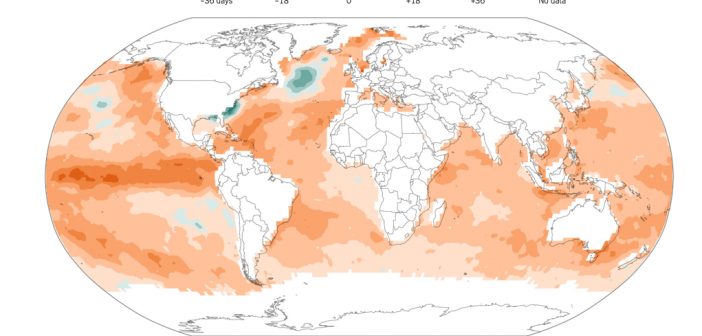Heat waves in the ocean are occurring more often, and lasting much longer, than they have in the past, and they’re threatening marine life around the planet. Here’s a solid report from The New York Times about what this means:
When deadly heat waves hit on land, we hear about them. But the oceans can have heat waves, too. They are happening far more frequently than they did last century and are harming marine life, according to a new study.
The study, published Monday in the journal Nature Climate Change, looked at the impact of marine heat waves on the diversity life in the ocean. From coral reefs to kelp forests to sea grass beds, researchers found that these heat waves were destroying the framework of many ocean ecosystems.
Marine heat waves are said to occur when sea temperatures are much warmer than normal for at least five consecutive days.
Scientists estimate that the oceans have absorbed more than 90 prevent of the heat trapped by excess greenhouse gases since midcentury. Humans have added these gases to the atmosphere, largely by burning fossil fuels, like coal and natural gas, for energy.
This excess is increasing not only baseline ocean temperatures but also the frequency and duration of marine heat waves.
An earlier study by some of the same researchers fund that, from 1925 to 2016, marine heat waves became, on average, 34 percent more frequent and 17 percent longer. Over all, there were 54 percent more days per year with marine heat waves globally.
The most severe years tended to be El Niño years. Warmer ocean temperatures are one of the characteristics of an El Niño pattern.
“There’s also some indication that El Niños have been getting more extreme with climate change,” said Eric C. J. Oliver, an assistant professor of physical oceanography at Dalhousie University in Halifax, Nova Scotia, who was a co-author of the study. But regional heat waves can happen even without an El Niño, he said.
As ocean heat waves proliferate, problems will mount for people who depend on fishing and fish farming, or aquaculture, said Gretchen Hofmann, chairman of the department of ecology, evolution and marine biology at the University of California, Santa Barbara. Read more:




